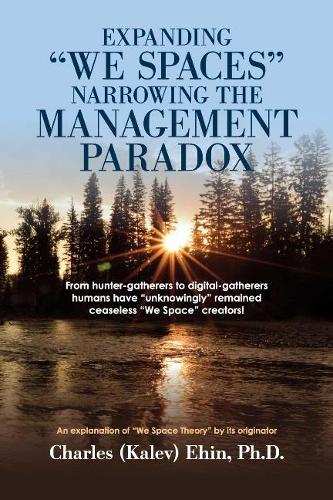
Expanding "We Spaces" Narrowing the Management Paradox: An Explanation of We Space Theory by its Originator
(Paperback)
Publishing Details
Expanding "We Spaces" Narrowing the Management Paradox: An Explanation of We Space Theory by its Originator
By (Author) Charles Ehin
BookBaby
BookBaby
27th January 2021
United States
Classifications
General
Non Fiction
Management decision making
Physical Properties
Paperback
44
Width 152mm, Height 228mm, Spine 5mm
86g
Description
Since the Agricultural Revolution, roughly 12,000 years ago, we have gradually developed a two-pronged approach to managing people. One is the practice of using managers to assure that every member of an organization reporting to them thoroughly understands what's expected of them and properly follow established goals and directives. Concurrently, bosses expect every subordinate to be as fully engaged with their assignments and designated coworkersperform integrated self-management.
Using both approaches simultaneously is far from ideal. It usually does produce "adequate" results but considerably less than using the latter method independently. Specifically, dominance (attempted control of others) instantaneously generates subconscious resistance since it is a "perceived threat." Conversely, extended autonomy (self-management) instantaneously generates perceived acceptance since it's a "perceived reward."
We Spaces are not new. They have been the "key features" of all social systems since before the dawn of our species. We are members of countless We Spaces throughout our lives. Yet, we pay little attention to them, especially in our formal/public institutions, since they tend to be "invisible," conveniently tucked away in our subconscious minds.
Essentially, We Spaces are the "relatively small intimate and voluntarily formed well-being zones" that provide comfort and sustenance to all of us as much as possible. They are also key to the preservation of our individual identities. It's the recognition by all that collaboration, instead of attempts at domination, are in the best interest of everyone involved.
Author Bio
Charles (Kalev) Ehin is the author of three management books and numerous articles about engagement and self-management. He is also the originator of We Space Theory. Currently he is Professor and Dean Emeritus at The Gore School of Business at Westminster College in Salt Lake City, Utah. Prior to joining Westminster College, he was an organizational development manager at E-Systems-Montek Division in Salt Lake City. He also served in the US Air Force as an officer for 20 years where he was a member of the Air Command and Staff College faculty for serval years. In, Coming Home, he describes his flight from Estonia and life as a refugee in pre and post WW II Germany.
